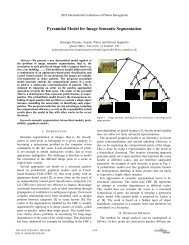Abstract book (pdf) - ICPR 2010
Abstract book (pdf) - ICPR 2010
Abstract book (pdf) - ICPR 2010
- TAGS
- abstract
- icpr
- icpr2010.org
You also want an ePaper? Increase the reach of your titles
YUMPU automatically turns print PDFs into web optimized ePapers that Google loves.
Liu, Cheng-Lin, Chinese Acad. of Sciences<br />
Tracking is recently formulated as a problem of discriminating the object from its nearby background, where the classifier<br />
is updated by new samples successively arriving during tracking. Depending on whether labeling the samples or not, the<br />
tracker can be designed in a supervised or semi-supervised manner. This paper proposes a novel semi-supervised algorithm<br />
for tracking by combining Semi-supervised Discriminant Analysis (SDA) with an online boosting framework. Using the<br />
local geometric structure information from the samples, the SDA-based weak classifier is made more robust to outliers.<br />
Meanwhile, we design an incremental updating mechanism for SDA so that it can adapt to appearance changes. We further<br />
propose an Extended SDA (ESDA) algorithm, which gives better discrimination ability. Results on several challenging<br />
video sequences demonstrate the effectiveness of the method.<br />
16:40-17:00, Paper WeCT1.4<br />
Optical Rails: View-Based Track Following with Hemispherical Environment Model and Orientation View<br />
Descriptors<br />
Dederscheck, David, Goethe Univ. Frankfurt<br />
Zahn, Martin, Goethe Univ. Frankfurt<br />
Friedrich, Holger, Goethe Univ. Frankfurt<br />
Mester, Rudolf, Goethe Univ. Frankfurt<br />
We present a purely view-based method for robot navigation along a prerecorded track using compact omni directional<br />
view-descriptors. This paper focuses on a new model for the navigation environment to determine the steering direction<br />
by efficient holistic comparison of views. The concept of view descriptors based on low-order expansion of local orientation<br />
vectors into spherical harmonic basis functions is augmented by a linear illumination model, providing discriminative<br />
view matching also under illumination changes.<br />
17:00-17:20, Paper WeCT1.5<br />
Forward-Backward Error: Automatic Detection of Tracking Failures<br />
Kalal, Zdenek, Univ. of Surrey<br />
Mikolajczyk, Krystian, Univ. of Surrey<br />
Matas, Jiri, CTU Prague<br />
This paper proposes a novel method for tracking failure detection. The detection is based on the Forward-Backward error,<br />
i.e. the tracking is performed forward and backward in time and the discrepancies between these two trajectories are measured.<br />
We demonstrate that the proposed error enables reliable detection of tracking failures and selection of reliable trajectories<br />
in video sequences. We demonstrate that the approach is complementary to commonly used normalized<br />
cross-correlation (NCC). Based on the error, we propose a novel object tracker called Median Flow. State-of-the-art performance<br />
is achieved on challenging benchmark video sequences which include non-rigid objects.<br />
WeCT2 Topkapı Hall A<br />
Pattern Recognition Systems and Applications - II Regular Session<br />
Session chair: Marinai, Simone (Univ. of Florence)<br />
15:40-16:00, Paper WeCT2.1<br />
Scene-Adaptive Human Detection with Incremental Active Learning<br />
Joshi, Ajay, Univ. of Minnesota, Twin Cities<br />
Porikli, Fatih, MERL<br />
In many computer vision tasks, scene changes hinder the generalization ability of trained classifiers. For instance, a human<br />
detector trained with one set of images is unlikely to perform well in different scene conditions. In this paper, we propose<br />
an incremental learning method for human detection that can take generic training data and build a new classifier adapted<br />
to the new deployment scene. Two operation modes are proposed: i) a completely autonomous mode wherein first few<br />
empty frames of video are used for adaptation, and ii) an active learning approach with user in the loop, for more challenging<br />
scenarios including situations where empty initialization frames may not exist. Results show the strength of the<br />
proposed methods for quick adaptation.<br />
- 204 -



